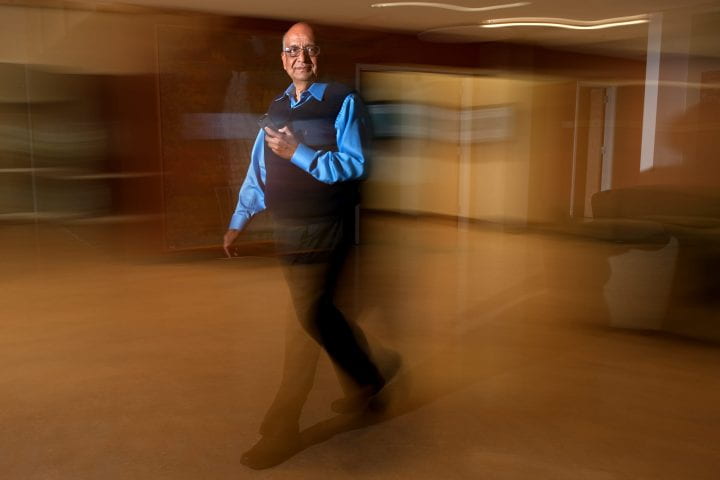Focused on the big picture
Computer scientist aims to integrate health data and make it globally available – by phone

Ramesh Jain is wired for health. The courtly UC Irvine computer science professor has a black NikeFuel wristband that flashes blue numbers, an oblong black amulet dubbed Fitbit around his neck, and a special app on his iPhone. All let him know – waking or sleeping, walking to class or waving his arms – exactly the amount of energy he’s burning and other key health indicators. As someone who has conquered cancer, that’s important to him.
Soon, thanks to work he and his team are doing, his doctors and many others should be able to download data from multiple sources and have it processed into a complete picture of a patient’s health. They could then recommend behavioral changes, customized treatments and other lifesaving measures.
Jain wants everyone in the world, rich or poor, to have access to such mobile health aids, via an innovative process he and his students call “social life networks.” Three to four billion people globally have no access to computers but do possess so-called “feature phones” which have wireless Internet access and limited images. Jain thinks mobile networks could be a godsend in rapidly growing economies where food, water, healthcare, transportation and education are still often substandard.
“Individuals rely on myths, intermediaries or outdated information to try to meet their basic needs – information limited to what’s available in the local village or neighborhood. This lack of current, factual information creates corruption, nepotism, wasted aid and poor healthcare practices,” he wrote in an abstract for the American Association for the Advancement of Science’s 2013 annual meeting in Boston, at which he spoke.
Open-government initiatives that aim to combat these problems are emerging in Bangladesh, the Cayman Islands, Colombia, Ecuador, India, Macedonia, Mexico and the Ukraine, Jain says. However, they focus on static information and reports obtained after the fact.
Via the social life networks, which parents of a feverish child could connect via mobile phone with a nurse or doctor who could determine whether the child has malaria or something less threatening and identify where to go for treatment, via immediate, automatically integrated information.
Jain, who was born and raised in India and has traveled extensively to poorer parts of the world, feels strongly that even rudimentary mobile medical systems would be an improvement over “witch doctors” or local officials. He says they often tell people that an evil spirit has invaded the body and enormous sums of money must be paid for “treatments” that don’t work.
A key aspect of mobile systems is information assimilation, or combining many pieces of data to create an understandable picture. People who are illiterate, for instance, could obtain critical help on their phones via images similar to those used in video games.
Information assimilation has fascinated Jain since he was a young electrical engineer in India, exploring artificial intelligence with one of the original IBM computers – a machine the size of four rooms. Now he and his research team are working hard to perfect computing processes on handheld phones that best combine input from multiple sources to create a whole picture.
“Currently, you get text, videos, all kinds of things, but there is nothing that contains the real, complete aspect of what you are seeing, what you are hearing, and how it all goes together,” he says.
Getting full, accurate data is important in his personal as well as professional life. A few years ago, he battled gastro-esophageal cancer, undergoing chemotherapy, radiation and extensive surgery. Today he is healthy and eager to stay that way. He’s also human, not a machine.
Jain drew hearty laughs at the AAAS conference when he compared his and his spouse’s differing recollections of his health habits:
“Because of the cancer, many times my wife wants to be with me when I go to the doctor. And the doctor asks me, ‘So, are you doing good exercise?’ And, naturally, I will answer, ‘Yes, I do half an hour every day at least four days a week!’ And my wife will say, ‘He’s lying! He does only five or 10 minutes twice a week!’”
Soon, his own phone and other devices will settle the matter. “This thing can tell me I’ve been walking for two minutes, I’ve been in the car for four minutes, every single thing I do,” he says, gesturing to his smartphone.
Jain, who joined UC Irvine in 2005 as the first Donald Bren Professor of Information & Computer Sciences, has had a long career developing another kind of network: bright acolytes who go on to do great things. He recently won an ICS Dean’s Award for Graduate Student Mentoring, which cited his fostering of “a large and strong research group developing next-generation social networks.”
Previous students include Thomas Knoll, co-inventor of Photoshop; Tony Fadell, co-creator of the iPod and founder of Nest; and Bradley Horowitz, vice president of product management at Google +. All worked with Jain at the University of Michigan, Ann Arbor more than a decade ago, and he predicts that his UC Irvine students will be just as innovative.
“I love interacting with young people; they are full of energy. They have lots of interesting ideas…. Listen to them and encourage them. Then wonderful things happen,” he says quietly.
His pupils repay the compliment.
“I have learned lots of things from Ramesh, not only related to science but also valuable life lessons,” says Laleh Jalali, who’s pursuing a doctorate. “He taught me to be myself, live my dreams and enjoy my life, even as a grad student! I’m so glad I have a chance to work with him.”